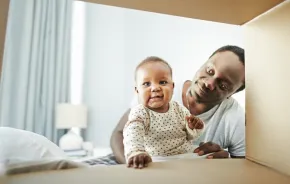 The “Brainy Baby” video series claims it will “help stimulate your child’s cognitive development.”
The “Brainy Baby” video series claims it will “help stimulate your child’s cognitive development.”
The Disney-owned Baby Einstein Co.’s “Baby Shakespeare” DVD purports to “present infants with 12 common words found within the rich context of classic poems.”
As a parent of a busy 14-month-old son, this writer wonders why these companies don’t promise what busy moms and dads really crave from time to time: a 30-minute break! Let’s face it: In the world of competitive college admissions — even competitive preschool admissions — many parents want a leg up. The educational bent to video marketing appears to be working. In a study conducted by the Kaiser Family Foundation, about half of parents (49 percent) say they consider these educational videos “very important” to their child’s intellectual development.
Now comes the recent University of Washington study finding that language development actually suffers when 8- to 16-month-olds watch baby DVDs/videos for an hour a day. The press release prompted Disney to threaten legal action against the UW.
What are confused parents to do?
Consider expert advice
First, some experts say, parents should recognize that no DVD can teach cognitive development or language formation as well as a human caregiver. “Einstein and Mozart never watched these videos,” Bellevue pediatrician Donald Shifrin says. “But parents are vulnerable to these messages and the heavy marketing from the video companies.” In addition to his clinical practice, Shifrin is a member of the American Academy of Pediatrics’ Council of Communications and Media. “From early on, the message from parents will be that when you don’t have anything to do, watch TV. When you’re bored or tired, here is a screen for you.” Since 1999, the AAP has recommended no TV for infants younger than 2 years old.
Kingston mom Morgan Harris has two children, Lillian and Matthias, ages 1 and 5. She says she doesn’t view these videos as a learning tool, but simply a form of entertainment. In fact, with her second child, the Harris household has scaled back on media use: As an infant, Matthias watched more TV and videos than Lillian does, Harris says, because he did not have the built-in sibling playmate. “He is a lifesaver to Lillian,” says Harris. “He’ll point out things and with a lot of talking. She gets great verbal stimulation from him.”
Consider how you're using these DVDs and videos
The Seattle-based company Braincandy has five new entries into the baby DVD market. Co-founder Sam Reich-Dagnen says the goal for her videos is to inspire kids to explore their five senses. “When we created the formula, we said: ‘No toys that lull kids into sleep.’” As a parent of two young children, Reich-Dagnen admits that no video should be a “first choice” for parents. “They shouldn’t be watching them instead of going to the park or children’s museum.” She says, ideally, parents would watch the videos with their children, asking questions, encouraging curiosity.
Harris recalls baby-sitting another family’s 1-year-old recently. She saw the boy’s mood drastically change when the baby video music began to play. “He was mesmerized. It definitely calmed him down, so I suppose it was something that would provide a time-out for his parents.” Shifrin argues that parents have more alternatives than they realize. A child playing in their room quietly is not bored; rather they are getting a chance to develop creative, independent play, she says.
The “Calm Baby” series, with water sounds, claims to relax children. But lulling children to sleep electronically is a big no-no, says Shifrin, especially if it involves having a television in an infant’s bedroom. Rocking an infant or playing music is naturally soothing to the brain, Shifrin says, while a television screen is artificially mesmerizing. Perhaps surprising to some, the Kaiser study found that more than one-fourth of kids 0-2 have televisions in their bedrooms.
Experts say the bottom line is that human interaction is best. “The more you demonstrate to kids, the more they learn,” says Shifrin. “Every family has to answer for themselves what is an acceptable amount and type of screen time.”
Hilary Benson has three children including an infant. She is a freelance writer living in the Seattle area.











